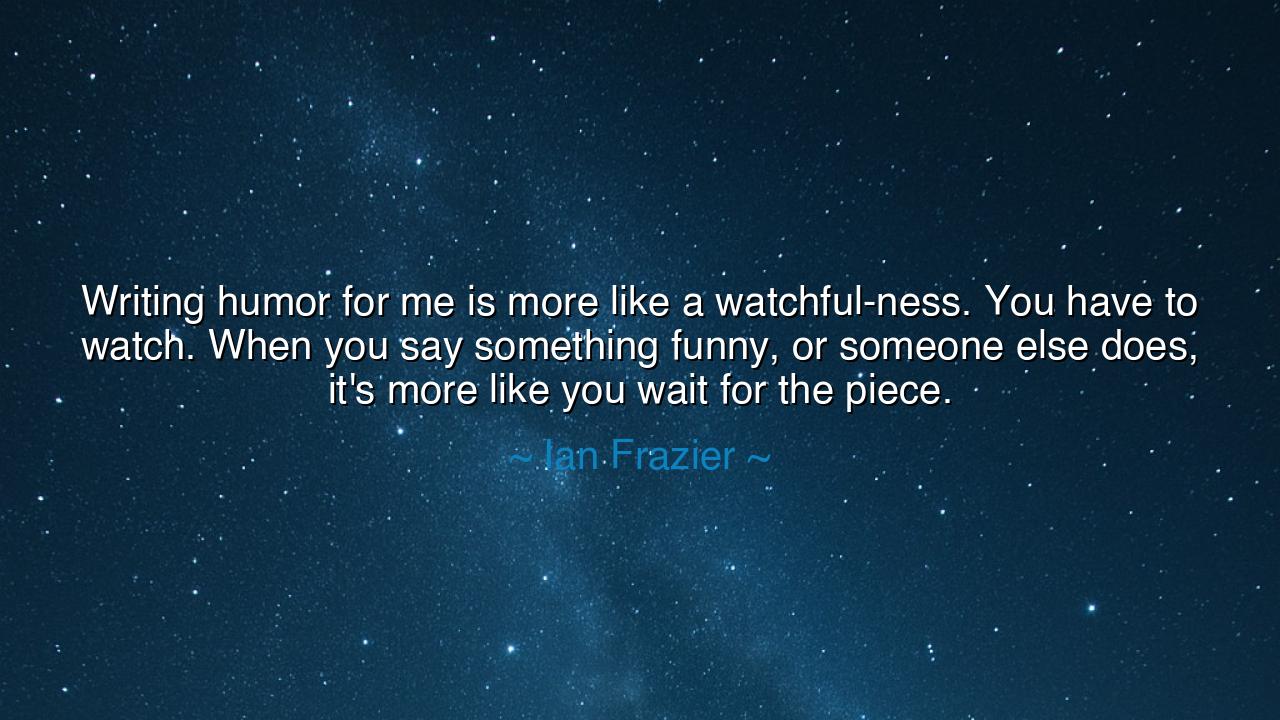
Writing humor for me is more like a watchful-ness. You have to
Writing humor for me is more like a watchful-ness. You have to watch. When you say something funny, or someone else does, it's more like you wait for the piece.






Hear the words of Ian Frazier, the quiet sage of observation and wit: “Writing humor for me is more like a watchful-ness. You have to watch. When you say something funny, or someone else does, it’s more like you wait for the piece.” Beneath this simple confession lies a timeless truth about creation, patience, and the art of seeing. For humor, in its truest form, is not forced—it is found. It is not the invention of the clever, but the discovery of the watchful. And so Frazier’s words call us to awaken our eyes and our hearts, to listen more deeply to the music of life, and to find laughter not through noise, but through awareness.
In the world of the ancients, the act of watching was sacred. The philosopher gazed upon the stars to understand the heavens; the poet listened to the wind to hear the voice of the gods. Likewise, the humorist, in Frazier’s sense, must become a silent observer of humanity. He must see what others overlook—the small absurdities of daily life, the tender contradictions of the human heart. The true writer of humor does not mock the world but honors it, finding in its imperfections a mirror of our shared condition. For to laugh wisely is to see clearly, and to see clearly is the beginning of wisdom.
Frazier’s idea of “waiting for the piece” speaks of humility, a trait often forgotten in the age of noise and haste. The fool rushes to speak, filling silence with empty words. But the wise humorist waits, allowing truth to reveal itself in its own time. This watchful-ness is not laziness—it is reverence. It is the understanding that the world, if given patience, will show its comedy and its meaning without being forced. The laughter that arises from such patience is pure and healing, for it springs from truth.
Consider the tale of Mark Twain, who walked the banks of the Mississippi not as a conqueror of words, but as a watcher of men. He observed the gamblers, the drifters, the preachers, and the dreamers who floated through that river life, and from their movements, he crafted stories that still echo today. Twain once said that the secret of humor is “not in telling, but in seeing.” This is what Ian Frazier reminds us of—that humor, like wisdom, is born in stillness. It comes when we quiet our egos and open our eyes to the world as it is.
To practice watchful-ness is to cultivate compassion. When we observe rather than judge, we begin to see the small heroism and foolishness that dwell in every soul, including our own. We see how pride disguises fear, how anger hides sorrow, how laughter can heal wounds too deep for words. The humorist who sees these truths does not ridicule humanity; he embraces it. His laughter becomes a bridge between the tragic and the divine. It reminds us that, even in our frailty, we are worthy of joy.
There is also courage in this kind of patience. To wait for the piece is to trust that inspiration will come, that the world will whisper its story when it is ready. It is a form of faith—the same faith that guided the prophets, the poets, and the artists of every age. For the universe, though often silent, is never empty. It speaks through the fall of a leaf, the glance of a stranger, the pause before laughter. The writer of humor listens for these moments, then shapes them into words that awaken the heart.
Thus, let this teaching be passed on: be watchful in your living. Do not rush to speak, to create, to judge. Instead, observe. Let life unfold before you, and you will find in its rhythm both truth and laughter. Learn to laugh not because the world is foolish, but because it is wondrous. Wait for your “piece,” whatever it may be—a story, a thought, a revelation—and when it comes, greet it with gratitude. For the one who sees with patience will find endless inspiration in the smallest things.
So remember, as Ian Frazier teaches: humor is not the art of noise, but the art of noticing. It is the gentle spark that appears when the soul is still enough to see the beauty in imperfection. In your writing, your work, and your days, strive to be like the watchful sage—quiet, present, and open to wonder. For when you learn to watch, the world will begin to speak, and in its voice, you will find both wisdom and laughter—the twin lights that guide all who seek to understand the human heart.






AAdministratorAdministrator
Welcome, honored guests. Please leave a comment, we will respond soon